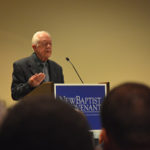ATLANTA (ABP)—Baptists of different stripes can multiply their influence and foster reconciliation by working together to advocate on behalf of others in the public square, Stephen Reeves told the recent New Baptist Covenant Summit in Atlanta.
“At its core, I think advocacy is just speaking out for others, for someone else, putting their needs equal to your needs,” said Reeves, associate coordinator of partnerships and advocacy for the Cooperative Baptist Fellowship. “That’s about as a good a definition of the Golden Rule, of loving your neighbor as yourself, that I know of.”
 Reeves, former public policy director for the Texas Baptist Christian Life Commission, insisted advocacy doesn’t have to be big or complicated.
Reeves, former public policy director for the Texas Baptist Christian Life Commission, insisted advocacy doesn’t have to be big or complicated.
“It doesn’t have to be lobbying Congress, although it can,” he said. “There’s a lot of ways to be an advocate, and there’s a lot of ways you can work together on behalf of others and their well-being.
“In the political realm, that comes in stark contrast to lobbying with self-interest, which is the way most folks do it. It’s not really advocacy when it’s for your own benefit or for those that you represent. That’s a key difference here.”
Church-based advocacy begins by looking at local needs, Reeves said.
“Start by looking outward and becoming a voice for those folks you see in your community,” he advised.
On the same team
Reeves, who in Texas worked with Catholics and other faith groups against predatory lending practices such as payday loans, said a real benefit of partnering with others in advocacy is “that you all become members of the same team.”
Sign up for our weekly edition and get all our headlines in your inbox on Thursdays
“In the political realm—whether it be City Hall or the State Capitol or the U.S. Capitol in Washington—the faith community is one constituent group,” he said.
“When you’re lumped together like that and you’re working together, you’re suddenly on the same team in ways you’re not if you’re thinking about the church across town in terms of their membership and your membership, your denomination and your particular faction in Baptist life. Suddenly, when you take it to a different realm, you’re the faith community. You’re on the same team, and that’s a real benefit.”
Too often, churches are hesitant to take up the advocacy role, for several reasons, he said.
“In our context, there’s been a lot of bad examples of Baptists who have really turned folks off that we have to get over,” he said. “There’s the idea that somehow church/state separation prevents you from talking about these political issues and these systematic changes in church, and that’s not what that means. You can do that and should do that.”
People notice
Partnering with others in advocacy on behalf of others is beneficial to both the church and community, and when it happens, people notice, Reeves said.
“When you walk in together arm-in-arm with a fellow Baptist that may look different than you do and maybe worships different than you at a different church, and then you work on behalf of someone else not even in the room, not only do the politicians, the city council or the mayor notice that, I think other folks in your community notice that,” he said. “It’s a way and a model that has not been done enough in terms of faith-based efforts in public policy.”
It’s important to “pay attention to your comfort zone” when working with other groups, Reeves said.
“People do advocacy in different ways,” he said. “When you decide to take on systematic change, somehow or another at some point, it’s going to get real uncomfortable for you.
“I might feel more comfortable walking into a senator’s office and sitting down and trying to talk about an issue and doing that kind of traditional lobbying. I’m not as comfortable marching and chanting and holding signs, but that’s just another way to do advocacy. They can both be equally effective.”
Get out of your comfort zone
Reeves encouraged churches in partnership to “use different tools and get out of your comfort zone.”
“I think that can lead to some real reconciliation work among those that you’re with, to know that you’re doing things that may not be the way you or your community typically does it, but you’re doing it on behalf of others together, and that can be a real work of reconciliation,” he said.
The issues that inspire groups to work together matter, Reeves said.
“For me, the issue of predatory lending has been an incredibly good issue to take on,” he said. “It’s one that can unite folks that are very different. It’s not a partisan issue completely. There’s a lot of agreement. There’s some real biblical foundations and real Christian, ethical and moral considerations for how you treat the least of those among you and real matters of justice and fairness that when you work together on something like that reconciliation happens.”
It’s also an issue “that the church takes on whether they want to or not on a weekly basis,” in the form of stewardship, he said.














We seek to connect God’s story and God’s people around the world. To learn more about God’s story, click here.
Send comments and feedback to Eric Black, our editor. For comments to be published, please specify “letter to the editor.” Maximum length for publication is 300 words.